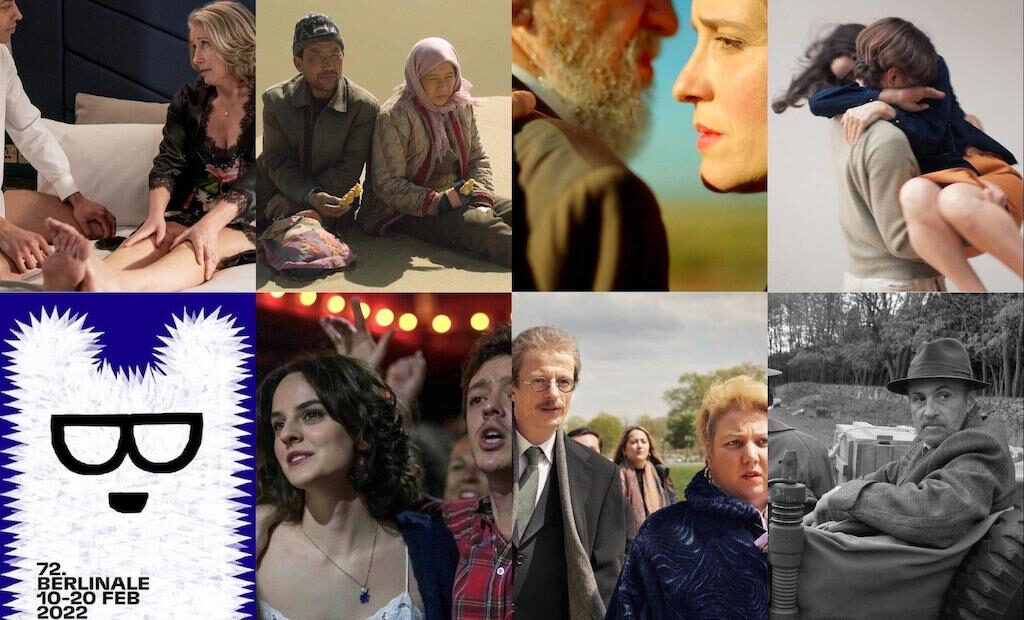Berlinale 2022: Awards predictions and highlights from the festival

As Berlinale 2022 draws to a close – finally back in person after last year’s all-digital edition – it’s time for the awards from the jury led by American filmmaker M Night Shyamalan. Our writers Selina Sondermann, Oliver Johnston and Sarah Bradbury share with us their predictions and highlights from the festival.
The Golden Bear for Best Film
Selina Sondermann
Leonora Addio, hands down. Paolo Taviani’s film is exactly what a viewer expects and desires from a festival such as the Berlinale: something fresh, a cinematic experience that is not deliberately designed to appeal to the masses, but still allows an audience to be engaged. This homage to Sicilian writer Pirandello is the most innovate entry to the official competition, as it is playful with form, interlacing different kinds of footage with a clear objective. It is equal amounts amusing and thought-provoking, a creative patchwork about creation itself.
Favourite film overall
Selina Sondermann
I have to admit, I was underwhelmed by many of the films this year. A lot of them seemed very deliberately made for festivals, disregarding factors necessary for subsequent distribution. Especially in complicated times like these, I feel that independent film should not turn its back so easily on the entertainment factor and the rewarding qualities of a good story. The films I personally enjoyed watching the most were the two May-December romances Good Luck to You, Leo Grande and A E I O U – A Quick Alphabet of Love. Stylistically very different from each other, both are well written, and demonstrate that art and plot are not mutually exclusive.
Oliver Johnston
The City and the City has to be acknowledged as one of the most unique viewing experiences of the festival. The film’s origins as a museum-based video installation are quite evident, so it’s remarkable that it works so well as a narrative piece – albeit an unconventional, nonlinear one. Its depictions of a lesser-explored chapter of WW2 are tremendously affecting, and the film doesn’t let its distinctive visual style dilute its sobering subject matter.
Sarah Bradbury
The film that hit me the most was One Year, One Night. Noemie Merlant’s performance opposite Nahuel Pérez Biscayart is incredible. Isaki Lacuesta’s brave feature is very hard to watch at times, as it fully relives, beat by beat, the trauma of the Paris Bataclan terrorist attack as well as the aftermath. But it’s also very powerful and resists cliché – particularly in its representation of the different ways we all process grief and how it can affect our relationships, without falling into over-sentimentality. Furthermore, it makes you realise the role cinema can play in helping us process our collective grief.
The Silver Bear for Jury Grand Prize
Selina Sondermann
Since the Berlinale is, and always has been a political festival, I can easily see Rabiye Kurnaz vs George W Bush as the runner-up. A regular guest at the festival, Andreas Dresen advocates against the gross injustices of Guantanamo in his latest feature, by taking a rather unusual approach. Most filmmakers would have opted for shock value, and appealed to the audience’s conscience with depictions of Murat’s suffering amid the unlawful imprisonment and torture; Dresen chooses hope over despair. His story is told from the point of view of Murat’s mother, as he follows the vivacious woman on her arduous battle against courts and governments.
The Silver Bear for Best Director
Selina Sondermann
This category I find rather hard to assess, because it depends entirely on the jury’s interpretation and expectations of film direction. In terms of visual translation, Swiss director Michael Koch impressed audiences by telling a story with familiar elements through new perspectives. A Piece of Sky is an unprettified relationship drama, that shows how mistakenly glorified rural living can be.
Alternatively, I could see this award going to Phyllis Nagy for Call Jane, the only big Hollywood production this year. The historical feature about women coming together against oppression and organising an underground abortion network is ambitious and full of substantial performances.
Silver Bear for Best Leading Performance
Selina Sondermann
This award has to go to Stéphanie Blanchoud, who terrifies and enthrals us in La Ligne. Her character, Margaret, is a musician with anger issues. Without justifying her behaviour or finding comfortable explanations (for example, drugs, a cycle of physical abuse), Blanchoud bravely embodies a volatile and bruised human being. At the press conference, the multitalented actress shared that she stayed in character while writing music for this film.
Silver Bear for Bear Supporting Performance
Selina Sondermann
It is difficult to gauge how much screen-time is necessary to qualify for this award. But for me the best performance by a non-lead was Hans-Michael Rehberg’s in Rimini. He plays the protagonist’s father, suffering from dementia. Helplessly trembling, he wanders the halls of his nursing home. His frustration and confusion are portrayed so convincingly that I was briefly worried about an actual patient being exploited in the name of art, before I recognised the actor. He has only a handful of scenes but, with these, his presence manages to colour the entire film. I hope the jury is willing to recognise this astonishing effort with a posthumous award.
Favourite performance overall
Selina Sondermann
Overall the festival was laced with a number of superb performances. I was particularly impressed by the entire cast of Rabiye Kurnaz vs George W Bush, as it is not an easy feat to keep the tone light in the face of atrocities without risking the story’s integrity. The multiculturalism and the easy switching between languages is depicted exactly as I know it from my own day-to-day life.
Oliver Johnston
Hai Qing in Return to Dust. It’s important for a film to set its own pace, and for the viewer to agree with that pace – which is a roundabout way of saying that Return to Dust takes its time, and this feels entirely appropriate for its story. It could even have been a little longer with no complaints. In the role of Guiying Cao, Hai Qing gives a performance that’s simple in its honesty, without ever becoming basic. Playing a woman forced into an arranged marriage (and in context, that scenario isn’t as brutal as it may sound), Hai serves as the film’s heart, inviting empathy without allowing the character to be pitied. It’s a rather beautiful performance.
Best interviewee
Sarah Bradbury
I’m an unashamed fangirl of Charlotte Gainsbourg, so it was not only a festival highlight but a career highlight to interview her for The Passengers of the Night. I like the 80s Paris-set film, but I loved her performance in it. She’s an actress who only seems to get better with age and experience, and she and Isabelle Huppert are living proof that the concept that only youthful actresses can carry films as the protagonist is nonsense. Like Huppert’s role in About Joan, Gainsbourg’s explores the female experience with nuance and complexity, and looks refreshingly at how women in later life continue to find their own identities on their own terms – not only in relation to men and romantic relationships. While I had to share the time with other journalists, it was a real privilege to hear her give her thoughts on the film, the character, her own nostalgia for that period of time and the joy of reliving it, from its bad fashion to chain-smoking cigarettes, as well as teach her younger co-stars what it was like in the days before smartphones.
Highlights
Selina Sondermann
It was quite an atypical Berlinale, condensed to seven days, and less busy than expected. While Covid restrictions differed not too greatly from what worked very well in Venice and the organisation was well-conceived, the atmosphere could not compare to previous festivals.
My personal highlights were the interviews I got to conduct. Andreas Dresen is a director we studied in film school, so I was delighted to get to speak to him. I was equally happy to briefly chat to actress Sophie Rois about our shared background. And since his witchy trilogy influenced some of my own work, attending the premiere of Dark Glasses and catching a glimpse of legendary director Dario Argento was a great honour.
At this point I would also like to mention the importance of Brammibal’s, who are in no way affiliated with the festival, but, situated directly across from the action, they have been the unofficial caffeine and sugar dealer of attendees since 2019. Queues were massive, but the staff did a bang-up job and fed everyone with delicious vegan donuts!
Sarah Bradbury
I can’t remember if the last time I covered the festival in person was quite as manic, but as the Berlinale was cut from ten days to seven this year, the junkets and screenings certainly overlapped more than usual. Added into the equation was the need to do a daily Covid test to enter any of the buildings. This, combined with the usual drill that every junket seemed to be happening in different hotels across the city – and the fact I was self-shooting with my own camera set-up – resulted in many a headless chicken moment, sprinting through the streets clutching my tripod and hopping from one interview to the next with my lapel mic wires threatening to strangle me.
The red carpets were more fun than expected, just to soak up a bit of atmosphere that was sadly missing elsewhere. I did manage to steal a coffee with my brilliant colleague Selina, who worked like a Trojan on the reviews side, and a beer with another fellow journalist, but it was a bit too much work-no-play. Also, I was somehow just fascinated by Machine Gun Kelly and his performance as a troubled rap star in the affecting Taurus. He essentially seemed to be playing himself, so seeing him in person at the junket was also a highlight, as he has that old-school “rockstar” quality about his presence.
Oliver Johnston
There was actually some backlash to Berlinale returning as an in-person festival, with a few German media outlets suggesting it was too soon. However, some of us did it remotely for the second year running, which is akin to being confined to your room while bingeing an arthouse Netflix selection that someone else had chosen for you, while also remembering to shave and shower in case a last-minute Zoom interview is scheduled.
It’s a different viewing experience at home, and with the ability to pause the film, it’s possible to get a sense of how engaging the story is by how many times you want to take a mid-film cigarette break. Some pictures are only one or two cigarettes (or even none), but some of them pose a risk of giving you lung cancer. Hopefully Berlinale (and the world in general) will come roaring back in 2023, with 2022 being a soft, though well-handled re-opening.
Selina Sondermann, Oliver Johnston, Sarah Bradbury


























Facebook
Twitter
Instagram
YouTube
RSS